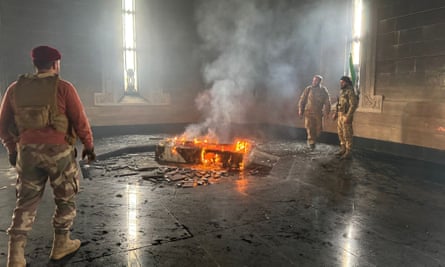To prepare khubeiza, the leaves of the kale-like plant must be roughly chopped and sauteed with onions, garlic and a dash of salt. Folklore says that the recipe originated among the Alawite communities who lived in Syria’s mountainous coastline where the fibrous, wild-growing plant can be found in abundance. So poor were the Alawites during Ottoman times, the story goes, that the only food they could find to eat was khubeiza, which sprouts like a stubborn weed every spring.
When Hafez al-Assad, a member of the minority Islamic Alawite sect, seized the reins of power in 1971, he promised to lift the neglected community out of its poverty and end its hunger.
Fifty-four years later, the streets of the town of Qardaha, the birthplace of Assad, tell a story of a promise unfulfilled. The town is dotted with shabby blocks of flats, where families huddled around diesel-fed stoves complain of constant blackouts and how the municipal water supply only comes for half an hour, once a week.
“The only section of the Alawites who were enriched were those who cooperated with the [Assad] regime. The rest of us are the lowest of all the Syrian people,” said Mazen al-Kheir, an anaesthetist from Qardaha. He said the religious minority was among the poorest in Syria and, contrary to the Assad’s regime’s rhetoric, received no favours from Alawite rule.
Instead, he said the space for dissent under the despotic Syrian regime was even more narrow for Alawites. Al-Kheir had been arrested for expressing opposition views.
“Threats that come from within the family are much more dangerous than those outside it,” he said.
Last week, however, days after the sudden fall of the Syrian president – Assad’s son, Bashar al-Assad – criticism of the regime flowed freely in Qardaha. The statue of the late Assad had been torn down from its place in the centre of the town and fighters from Hayat Tahrir al-Sham (HTS), the Islamist rebels who led the offensive against the Assad regime, roamed the streets.
Overlooking the town was a mausoleum for Hafez al-Assad, the ornate marble floor scorched black after people stormed the tomb the day before. HTS fighters shot rifles into the tomb and posed for pictures standing on the burnt-out husk of Assad’s casket, while a man driving an SUV did doughnuts on the once-manicured grounds outside.

While fighters celebrated victory, most Alawites were staying home, afraid of what was to come.
“They are celebrating the unknown,” Olga, a 35-year-old Alawite using a pseudonym, said on Wednesday from her home in Tartos, commenting on the sound of men driving by and cheering “Allahu Akbar” under her window.
As rebels approached Damascus last Saturday night, Olga’s family were fleeing in the opposite direction, heading towards Tartus on the Mediterranean coast. They were afraid rebels would retaliate against Alawites for their perceived association with the Assad regime.
The trip, which usually lasts three hours, took 20 hours as they had to pass through HTS checkpoints. At each they would wait, vulnerable and afraid. One fighter asked if they were Alawite, questioning whether they supported the soon-to-be deposed president before waving them through.
“There is happiness that we ended the oppression, but now we’re fearful of a new type of oppression,” Olga said, making a motion with her hand to mimic the long beards associated with devout Salafi Muslims.
Olga, a judge, returned to work for the first time on Wednesday. When she arrived at her office, she found her name placard shattered and a Qur’an placed on her desk. Her office was the only one to have been damaged and she feared it was because she was the only female judge working there.
For years, Bashar al-Assad has presented a stark choice to Alawites: me or Islamic State. Regime messaging to the religious minority community focused on the extremist elements of the opposition. A video published by extremist rebels during the Syrian civil war where they sang “We are coming to slaughter you, [Alawites]” sent fear through the community.
Though there was no love lost for Assad among the vast majority of Alwaites, many in the community believed that the opposition also wanted to harm them. “When the protests started in the mosque, rather than the university, we became afraid,” a woman in Qardaha said.
Olga, and more than a dozen other Alawite people with whom the Guardian spoke, said HTS’s behaviour and statements so far had been encouraging. Early on, the rebel group had published statements – including one issued directly to the Alawite community – that said religious minorities’ rights would be respected.
Senior HTS officials have held meetings with Alawite community notables to allay their fears, and the group’s leader, Ahmad al-Sharaa, has said that the only form of revenge will be the pursuit through court of those suspected of war crimes.
Olga said she feared HTS was waiting for the world to stop paying attention to Syria before imposing religious dogma on the country. The first televised meeting of the new transitional, civilian government placed the Syrian flag next to one with an Islamic creed on it, seemingly confirming Olga’s fears.
Olga has preemptively deleted all of her Facebook photos and locked down her social media profiles, for fear of attracting attention online from conservative users. “I am scared for my career and my personal beliefs. Will I be able to swim in a bikini now? I doubt it,” she said.
The Alawite towns and villages which dot the coastline are filled with martyr posters, depicting young men who were killed after being conscripted into the Syrian army. The Alwaite provinces were used as a labour pool for the beleaguered army throughout the civil war.
Ali, a 31-year-old engineer in Tartus, said he had been in hiding for years as he was wanted by the state for avoiding conscription. He did not have the money to pay the $8,000 (£6,300) fee to avoid military service. Though the official conscription period in the Syrian army was a year-and-a-half, many of his friends had been unable to leave the army for more than a decade, as the state retained them under “exceptional circumstances”.
“If you were an Alawite and you didn’t go to the army, they would call you a traitor. But soon it became clear to people that they only saw us as pawns,” Ali said. He wanted to celebrate the downfall of the regime like other Syrians, but decided to stay home instead, fearful of running into trouble.
“We hope that after everything we’ve been through, they will respect the rights of people. We hope that by dealing with us, they will get a more accurate picture of who we are,” Ali said.

.png) 3 months ago
32
3 months ago
32













































